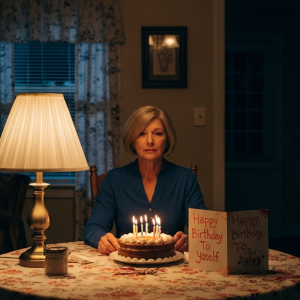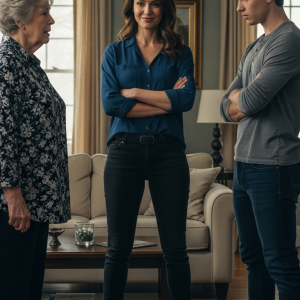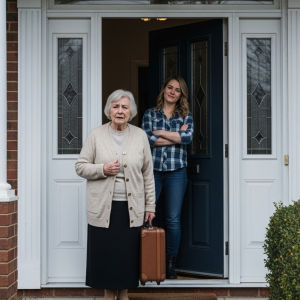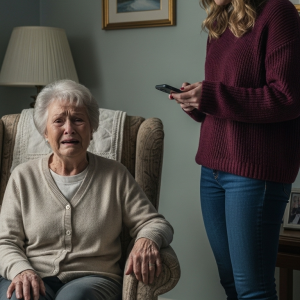My daughter-in-law, Patricia, walked into my sunlit kitchen with her usual bright smile, carrying two steaming cups of coffee as if they were the crown jewels. “I made you something special today, Eleanor,” she said, her voice a melody of practiced sweetness. It was a tone that always reminded me of artificial sweetener—cloying, and probably bad for you.
The coffee smelled wrong. Not overtly spoiled, but with a sharp, chemical undertone that snagged at the back of my throat. Call it professional instinct. When you’ve spent three decades putting criminals behind bars, you develop a nose for when something is dangerously out of place.
Patricia turned to the refrigerator, moving with a casual deliberation that was just a fraction too slow, a beat too rehearsed. In that brief moment, I quickly and silently switched our identical white mugs. Thank God for small details. Subtlety has never been my strong suit.
“There you go,” she said, settling across from me at the breakfast nook, now holding what was originally my cup. “Drink up while it’s hot.” Her smile was picture-perfect, the kind you see in family photos just before one of the subjects files for divorce and the other mysteriously disappears.
My son, Michael, was reading his newspaper in the living room, a portrait of domestic bliss. It had been a whirlwind romance—six months from their first meeting to their wedding three months ago. When you know you want someone’s money, I suppose you just know. I had tried to be supportive, but something about Patricia always felt rehearsed, like she was performing the role of “devoted daughter-in-law” from a well-worn script.
We chatted about the weather while I pretended to sip my coffee. I watched Patricia take her first real drink. Her face twisted for a microsecond, a flash of distaste she quickly masked. She set the cup down and didn’t touch it again. Interesting. Even more interesting was that she said nothing about the strange taste.
Twenty minutes later, it began. A small, polite cough, then another. Soon, she was wracked with deep, violent spasms that were impossible to fake. “Something’s wrong,” she gasped, her knuckles white as she gripped the table. Her face flushed a blotchy red, and I saw genuine panic flicker in her eyes. It was a fascinating turn of events.
“Michael!” I called, my voice even. “I think you should come here.”
My son rushed in just as Patricia doubled over, struggling for air between coughing fits. “Take me to the hospital,” she wheezed, clutching his arm with surprising strength. “Please… something is very wrong.”
As Michael helped her to the car, one thought repeated in my mind with the cold clarity of a legal argument: that coffee had been meant for me. My loving daughter-in-law had just poisoned herself with her own murder weapon. How delightfully ironic.
The emergency room was a symphony of controlled chaos. Patricia’s condition had worsened in the car; her breathing was labored, and an angry red rash was spreading across her neck like a medieval plague. The medical team swarmed her with impressive efficiency, hooking her to monitors and asking questions none of us could answer truthfully.
While Patricia was being examined, making a spectacular production of her suffering, Michael turned to me, his eyes wide with a worry that seemed genuine. “Mom, I’m going to run to our house to get her things. Pajamas, a toothbrush. She’ll want them when she’s admitted.”
“Of course, sweetheart,” I said, patting his arm. “You’re such a caring husband.”
He rushed off, and I settled into the waiting room, the two-year-old magazines offering little distraction from the fascinating turn my quiet Sunday had taken. Michael returned about an hour later with an overnight bag. Almost immediately, as if on cue, a Dr. Rodriguez emerged from the treatment area, his face grim.
“We found traces of a toxic substance in her bloodstream,” he announced. “This appears to be a case of deliberate poisoning.”
The word poisoning hung in the air. Before I could savor the irony, Patricia’s voice, remarkably strong for a woman at death’s door, rang out from behind the curtain.
“She did it! She poisoned my coffee!” Patricia pointed a trembling, accusatory finger directly at me. “Eleanor made me drink it.”
The police arrived within minutes. I told the lead investigator, a Detective Martinez, exactly what happened: the strange smell, my prosecutor’s instinct to switch the cups, Patricia drinking the coffee meant for me. “If you suspected the coffee was dangerous,” he asked, his tone skeptical, “why didn’t you just refuse it?”
“I wasn’t certain,” I said, which was technically true. “I just knew something was off.”
When they questioned Michael, his response cut deeper than any accusation. “My mother’s been acting strange lately,” he said, his gaze fixed on a point just past my shoulder. “I don’t think she’d hurt anyone, but…” That “but” was a betrayal sharper than any knife. My own son, hedging his bets.
Later that evening, Detective Martinez and his team were at my house, conducting what they called a “routine search.” Twenty minutes later, they found it: a small bottle of clear liquid tucked behind the aspirin in my bathroom cabinet, and a handwritten list that included Patricia’s name next to a chemical formula.
“How utterly, perfectly convenient,” I murmured as they held up the planted evidence. The handwriting was a masterful forgery of my own. The officers exchanged a look that screamed, We’ve got our suspect.
“Ma’am, we’ll be back tomorrow with a complete search warrant,” Detective Martinez informed me, his professional courtesy barely masking his conviction. A patrol car was stationed out front, a sentinel marking me not as a victim, but as a suspect in my own attempted murder. Whoever had orchestrated this was a creative and meticulous planner. How refreshing.
By morning, I knew I was hours away from being arrested. I dialed the one person I knew would believe me, my old partner from the prosecutor’s office, Frank Morrison.
“Frank, I’m in a terrible situation,” I said, the words tumbling out. I explained everything—the coffee, the frame-up, the planted evidence. “You know I would never poison anyone. Well, not anyone who didn’t deserve it, and certainly not with such sloppy technique.”
Frank’s response was immediate. “Eleanor, I just confirmed it through my contacts. They’re issuing an arrest warrant tomorrow morning. You need to get out of there. Now. Go out the back. Come to my place.”
Decades in law enforcement had taught me exactly how fugitives evade capture, a skill set I never imagined I’d use. I grabbed my essential documents, slipped out through my back garden, and took a series of trains and buses that eventually deposited me on Frank’s doorstep, officially a fugitive from justice.
“Well,” I said, as he opened the door. “This isn’t how I planned to spend my golden years, but it is more exciting than bridge club.”
Frank’s guest room became my safe house and our war room. “If they arrest me, I’ll never prove my innocence from a jail cell,” I told him. “We need to find out who Patricia really is, because I am certain ‘devoted daughter-in-law’ is not her actual profession.”
Frank, with his network of contacts, began making discreet inquiries. I, meanwhile, mentally re-examined every interaction I’d had with Patricia. Her vague stories about her past as a nurse in California, the subtle inconsistencies in her accent—small details I’d dismissed now loomed large.
The results of Frank’s investigation came back faster and were more disturbing than I could have imagined.
“Eleanor, your daughter-in-law doesn’t exist,” Frank announced, spreading documents across his kitchen table. “At least, not as Patricia Peterson. But I found her. Operating as Victoria Blackwood in Phoenix.”
The photo was unmistakably her. Victoria had been married to a 72-year-old widower who died eight months after their wedding from “complications related to food poisoning.” Then Frank found another identity: Sarah Mills in Denver, married to a 68-year-old who died of a “sudden cardiac arrest” four months after their wedding.
Patricia wasn’t just a con artist. She was a black widow, a serial killer who married wealthy older men and then inherited their fortunes after their conveniently timed deaths. She had turned matrimonial murder into an efficient and profitable business model.
“Frank, something is bothering me,” I said, a familiar prosecutor’s itch starting. “How did she plant the evidence in my house so quickly? She was under constant medical supervision at the hospital.”
“Someone else had to help her,” Frank said, his expression grim.
“But who had access during those exact hours?” The question hung in the air, the answer a cold, sickening dread that was already forming in my gut.
“Eleanor,” Frank said gently. “Only Michael.
Frank’s words haunted me. My son, an accomplice to a murderer? It was unthinkable. Then I remembered something. “Frank, I installed a security camera by my front door a few weeks ago.”
My hands shook as I pulled up the security app on my phone. We scrolled through the footage from that Sunday, both of us holding our breath. And there it was. Michael’s car pulling into my driveway at the exact time he claimed to be at his own house. Michael, letting himself in with his own key, staying inside for over an hour—more than enough time to plant the poison and the fabricated evidence. And then, the final, damning image: Michael slipping out the back door, clearly trying to avoid the front camera.
“He lied,” I whispered, the betrayal a physical blow. My son, the child I had raised, had actively participated in framing me for a murder he and his new wife had planned.
“Why?” I finally managed. “Why would he do this?”
I knew I had to confront him. It was dangerous, but I had to hear it from him. I had to understand how my own son could plot to kill me. That evening, I drove to his house, my heart a painful knot of anger and grief. Lights were on inside. I crept to a side window and listened, my phone already recording.
“Michael, stop feeling guilty about this,” I heard Patricia’s cold, calculating voice. “Remember what we’re doing this for. Seven million dollars and a new life.”
“I know, but seeing my mother like this, a fugitive…” Michael’s voice was weak, conflicted.
“Your mother,” Patricia purred, her manipulation masterful, “who treated you like a failure your entire life. Who never believed in you. With me, you are finally the man you were meant to be.”
“You’re right,” Michael said, his voice gaining conviction. “She never respected me.”
Suddenly, Patricia’s eyes locked onto my phone on the windowsill. “Michael, your mother is here.”
Before I could react, she had a gun in her hand. “You just made this so much easier, Eleanor,” her voice carried through the window, meant for me to hear. “Now I can claim self-defense.”
I dropped below the window as Patricia began to hunt me in the backyard, her voice a demented sing-song. “Come out, come out, wherever you are! We have to kill her for real this time, Michael!”
I could hear my son’s panicked protests, but he was following her orders. They were moving systematically through the yard. As they searched the far corner, I saw my chance. I slipped through the side gate, my heart pounding, and ran. I had it all on tape: their confession, their conspiracy, and Patricia’s explicit threat to kill me.
Back at Frank’s, we reviewed the new evidence. It was airtight. The next morning, I surrendered to the state police, simultaneously presenting them with the recordings that proved my innocence and exposed the entire conspiracy.
“This completely changes the investigation,” a stunned Detective Rodriguez said. “We’re issuing arrest warrants for both Patricia and your son immediately.”
They arrested Michael at his home, sitting alone in the living room. But Patricia was gone. She had vanished. Her final play was a masterstroke of cold-blooded betrayal. She called the police tip line from an untraceable number, claiming Michael had been the mastermind all along, that he had forced her to participate in the plot to poison me. Even on the run, she was trying to frame him, to save herself by sacrificing her partner.
The manhunt for Patricia, or Victoria, or Sarah, lasted six days. They found her at a hotel three states away, already researching her next wealthy widower online. When they brought her back in handcuffs, she was led past Michael’s cell.
“You lying witch!” he screamed, the full force of her betrayal finally hitting him. “You promised we’d be together!”
Patricia looked at him with an expression of cold amusement, as if observing a failed science experiment. “Oh, Michael, you sweet, stupid man. Did you really think this was about love?”
The trial was a spectacular display of mutual destruction. Each painted the other as the evil genius behind the plot. But Patricia’s past—the dead husbands, the multiple identities—was undeniable. The evidence against Michael, from the security footage to his own voice on the recordings, was equally damning.
The jury found them both guilty.
“Mrs. Peterson,” the judge said, her voice filled with contempt as she addressed Patricia, “you are a predator who has spent years targeting vulnerable people. This court sentences you to life in prison without the possibility of parole.”
Michael received twenty years for conspiracy and evidence tampering, his sentence lightened slightly for his cooperation in detailing Patricia’s methods.
I sat in the courtroom as they were led away in shackles, a strange mix of justice and sorrow washing over me. Patricia would spend the rest of her life in prison. Michael would lose the best years of his, paying for a betrayal that was almost incomprehensible. I was free, vindicated, and alive. But the cost was the absolute destruction of my family.
I had survived, but I had lost my son. The price of survival, I was learning, was sometimes everything you thought you were fighting to protect. But at least I had gotten the last word. And in the silent, empty house that was once filled with a family, that would have to be enough.




